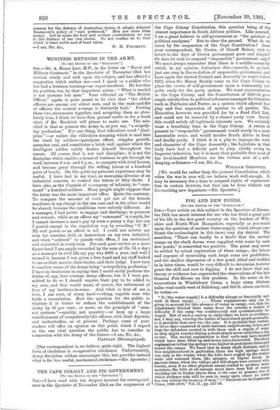THE CAPE COLONY AND ITS GOVERNMENT. pro THE EDITOR OF
THE " SPECTATOR."] SIR,—I have read with the deepest interest the correspond- ence in the Spectator of November 23rd on the suspension of the Cape Colony Constitution, this question being of the utmost importance in South African politics. Like yourself, I am a great believer in self-government as "the greatest of political anodynes." But to clear the ground. What do we mean by the suspension of the Cape Constitution P Does your correspondent, Mr. Carter, of Graaff Reinet, wish to revert to the days of Crown government pure and simple? Or does he wish to suspend " responsible" government only ? We must always remember that there is a middle course by which, in my opinion, tutissimus ibis,—namely, to go back just one step in the evolution of responsible government, and have again the elected Council and Assembly in vogue before 1872, when Sir Henry Barkly came to the Cape Colony to place the crown of self-government upon a community not quite ready for the party system. We want representation in the Cape Colony, and the Constitution of 1850-54 gave ample satisfaction to political reformers amongst the Colonists such as Fairbairn and Porter, as a system which allowed free play and free expression of opinion to all parties. The Executive, however, was provided for by a fixed Civil List, and could not be removed by a chance party vote. Surely this would satisfy all legitimate interests now. We certainly want a breathing time in the Cape Colony. A return at present to " responsible " government would surely be a most lamentable error, and would involve South Africa in fresh and deadly perils. I think it is a pity to impugn the work and character of the Cape Assembly; the Loyalists in that body have had a difficult part to play, chiefly owing to Imperial indecision, but it is more than probable that most of the level-headed Members see the virtues now of a self. denying ordinance.—I am, Sir, &a,
WILLIAM GRESWELL.
[We would far rather keep the present Constitution, which when the war is over will, we believe, work well enough. It may be necessary for a time to suspend rights of representa- tion in certain districts, but that can be done without any far-reaching new departure.—En. Spectator.]














































 Previous page
Previous page